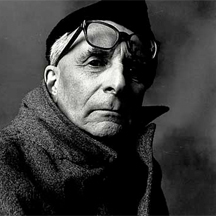 Reading over today’s obituary of that looming figure of the twentieth- (and twentieth-first-) century who seemed to watch over every discipline of critical theory, Claude Lévi-Strauss, I couldn’t help but apply my dusty knowledge of his structuralism to the hegemonic culture of wine today. After all, in some ways similar to Freud, Lévi-Strauss, who transpired over the weekend, will be remembered as much for his contribution to literary theory and epistemology as he is for his unapologetic transformation of the field of anthropology.
Reading over today’s obituary of that looming figure of the twentieth- (and twentieth-first-) century who seemed to watch over every discipline of critical theory, Claude Lévi-Strauss, I couldn’t help but apply my dusty knowledge of his structuralism to the hegemonic culture of wine today. After all, in some ways similar to Freud, Lévi-Strauss, who transpired over the weekend, will be remembered as much for his contribution to literary theory and epistemology as he is for his unapologetic transformation of the field of anthropology.
His fear of and subsequent predictions of a western behemoth “monoculture,” as it came to be known, have certainly taken shape in the evermore homologated contemporary world of wine today. The west, he wrote with words that seem to speak directly to the modern vs. traditional debate in European wine today, could destroy itself by “allowing itself to forget or destroy its own heritage.”
Lévi-Strauss wrote famously about wine: his treatment of the wine culture in southern France in his study The Elementary Structure of Kinship is often cited by scholars. (He also wrote about wine in The Origin of Table Manners.)
But wine, like bread, also held a special place in the lexicon of the great scholar and thinker. Like bread, wine represented for Lévi-Strauss a post-Neolithic technological transformation of the natural. Society (and the universal values that tie every expression of human experience together) is defined, according to Lévi-Strauss’s view, by a “rational” transformation of nature.
As Edward Rothstein wrote so ably in The New York Times today:
- Lévi-Strauss rejected Rousseau’s [historically romantic] idea that humankind’s problems derive from society’s distortions of nature. In Mr. Lévi-Strauss’s view, there is no alternative to such distortions. Each society must shape itself out of nature’s raw material, he believed, with law and reason as the essential tools.
Alas, we’ll never be able to ask Lévi-Strauss where he stands in the overarching dialectic of natural wine (and I can only imagine the ire this post will spark!). My own thought is that Lévi-Strauss and structuralism offer us a tool for understanding wine and its relationship to society. One can argue the finer points of ambient yeast, zero SO2, and minimal intervention vs. manipulation. But there is no denying that wine as an expression of society is shaped out of nature’s raw material by humankind — however minimal the intervention. Society by definition (and is there any wine that exists outside of society?) offers no alternative to the distortion of nature. Fermentation can occur spontaneously in nature. But the rational hand of humankind is what turns fermentation into wine.
What would Lévi-Strauss say? And who really cares? Probably no one but me.
What I can say for sure is that humankind has lost one of its greatest thinkers and one of the voices that helped to shape the very ideological dialectic from which the natural wine movement has culled its roots. If I only had a bottle of zero-SO2 Beaujolais for every night I spent cramming over the writings of Lévi-Strauss for my critical theory exams in grad school!
Lévi-Strauss, old man, you will be sorely missed…

And what a great portrait of Lévi-Strauss by Irving Penn (who died last month). Thanks, I hadn’t seen that one! I think he liked wine some, also: http://ow.ly/z2vm
Your tribute here is great, and the extensive obituary is very worth reading.
And what a great portrait of Lévi-Strauss by Irving Penn (who died last month). Thanks, I hadn’t seen that one! I think he liked wine some, also: http://ow.ly/z2vm
BTW I love your blog!
JP, Once again I am throughly held by your prose and subject matter. I am the other person that cares! Thank you for taking the time to synthesize these thoughts. They resonate with me even though I remember throwing more than one of his writings across the room oh so many years ago.